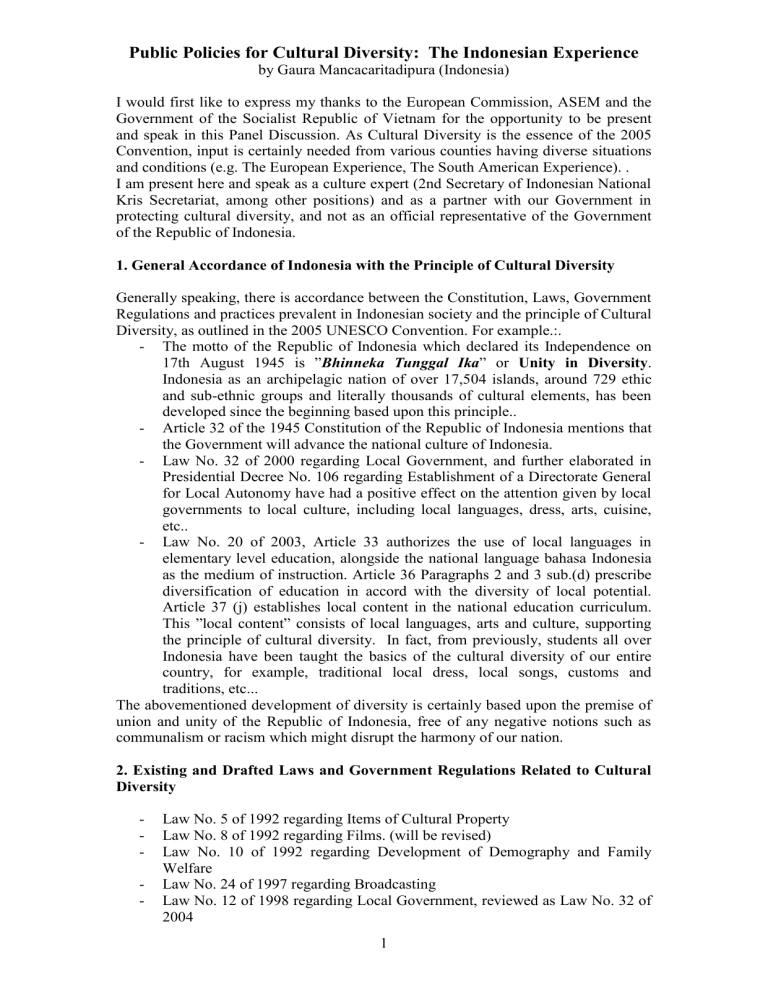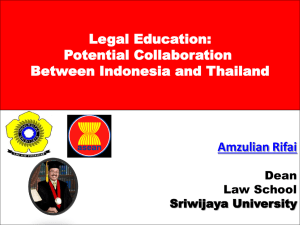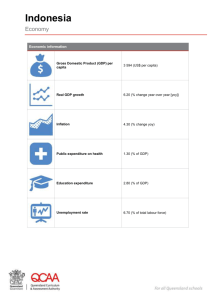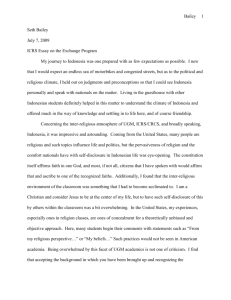Gaura Mancacaritadipura

Public Policies for Cultural Diversity: The Indonesian Experience
by Gaura Mancacaritadipura (Indonesia)
I would first like to express my thanks to the European Commission, ASEM and the
Government of the Socialist Republic of Vietnam for the opportunity to be present and speak in this Panel Discussion. As Cultural Diversity is the essence of the 2005
Convention, input is certainly needed from various counties having diverse situations and conditions (e.g. The European Experience, The South American Experience). .
I am present here and speak as a culture expert (2nd Secretary of Indonesian National
Kris Secretariat, among other positions) and as a partner with our Government in protecting cultural diversity, and not as an official representative of the Government of the Republic of Indonesia.
1. General Accordance of Indonesia with the Principle of Cultural Diversity
Generally speaking, there is accordance between the Constitution, Laws, Government
Regulations and practices prevalent in Indonesian society and the principle of Cultural
Diversity, as outlined in the 2005 UNESCO Convention. For example.:.
The motto of the Republic of Indonesia which declared its Independence on
17th August 1945 is ”
Bhinneka Tunggal Ika
” or
Unity in Diversity .
Indonesia as an archipelagic nation of over 17,504 islands, around 729 ethic and sub-ethnic groups and literally thousands of cultural elements, has been developed since the beginning based upon this principle..
Article 32 of the 1945 Constitution of the Republic of Indonesia mentions that the Government will advance the national culture of Indonesia.
Law No. 32 of 2000 regarding Local Government, and further elaborated in
Presidential Decree No. 106 regarding Establishment of a Directorate General for Local Autonomy have had a positive effect on the attention given by local governments to local culture, including local languages, dress, arts, cuisine, etc..
Law No. 20 of 2003, Article 33 authorizes the use of local languages in elementary level education, alongside the national language bahasa Indonesia as the medium of instruction. Article 36 Paragraphs 2 and 3 sub.(d) prescribe diversification of education in accord with the diversity of local potential.
Article 37 (j) establishes local content in the national education curriculum.
This ”local content” consists of local languages, arts and culture, supporting the principle of cultural diversity. In fact, from previously, students all over
Indonesia have been taught the basics of the cultural diversity of our entire country, for example, traditional local dress, local songs, customs and traditions, etc...
The abovementioned development of diversity is certainly based upon the premise of union and unity of the Republic of Indonesia, free of any negative notions such as communalism or racism which might disrupt the harmony of our nation.
2. Existing and Drafted Laws and Government Regulations Related to Cultural
Diversity
Law No. 5 of 1992 regarding Items of Cultural Property
Law No. 8 of 1992 regarding Films. (will be revised)
Law No. 10 of 1992 regarding Development of Demography and Family
Welfare
Law No. 24 of 1997 regarding Broadcasting
Law No. 12 of 1998 regarding Local Government, reviewed as Law No. 32 of
2004
1
Presidential Decree No. 100 of 1961 regarding Permission for Sending Artist
Mission Abroad
Government Regulation No. 10 of 1993 concerning the implementation of
National Law No. 5 of 1992
Government Regulation No. 19 or 1995 concerning the Preservation and
Utilization of Museum Collections.
Ministerial Decree No. 062 of 1995 concerning Ownership, Provisions,
Transfer of Ownership and Deletion of Items of Cultural Property
Ministerial Decree No. 063 of 1995 concerning Protection and Preservation of
Cultural Property
Ministerial Decree No. 064 of 1996 regarding Rewards and Determination of
Cultural Property
Formation of an Indonesian Association for Development of Knowledge and
Expression of Traditional Culture (2005)
Acceptance of the 2003 UNESCO Convention on Safeguarding the Intangible
Cultural Heritage through Presidential Decree No. 78 of July 2007
Draft Law on Culture
Draft Law on the Protection and Promotion of Traditional Knowledge and
Traditional Cultural Expression
3. Planned Interdepartmental Meeting on Proposed Acceptance of 2005
Convention on Cultural Diversity.
The Directorate General for Cultural Values, Arts and Film of the Department of
Culture and Tourism of Indonesia is presently considering the possibility of Indonesia accepting the UNESCO 2005 Convention on Cultural Diversity. The 2005
Convention has been translated into Bahasa Indonesia, and an academic paper justifying the proposed acceptance would be prepared for discussion in an
Interdepartmental Meeting. The presentations and discussions in this ASEM meeting will certainly provide important input for Indonesia’s deliberations as to whether to accept the 2005 Convention in time.
Several points arising from the Articles of the Convention likely to be discussed in relation to the proposed acceptance based upon an Official Report of the Indonesian
Delegation (Basuki Antariksa) dated 22nd June 2005, include Articles 2 para 1; 5 Para
1 and 2; 6 Para 2 c and e’ 7 1.(b)[ 8 para 2 and 3; 11. 18 para 3 and 7; 23 and 25. The benefits of acceptance of the Convention in the interests of Indonesia. are also discussed in detail in Ch. III of this report.
4. Some Examples of Government Support and Civil Participation in Protection of Cultural Diversity a. Beautiful Indonesia in Miniature (Taman Mini)
A Tourism Park in East Jakarta, built by Harapan Kita Foundation between 1972-
1975 and now under the State Secretariat. It is a miniature of Indonesia in the form of a small lake with tiny islands laid out as a map of the Indonesian archipelago. Around the perimeter of this lake are permanent exhibitions of each Province of Indonesia
(then 26, now 33). The exhibitions take the form of traditional houses containing displays of traditional dress, arts and cultural objects of each province. There are regular performances of various local arts such as dance, wayang puppetry, drama, local music, story-telling etc. Taman Mini also contains many specialized thematic museums and displays such as Kris, Military History, Post and Telecommunications,
Children’s Palace, Purna Bakti Museum, etc. Taman Mini plays a significant role in advancing cultural diversity of the many communities which make up the Indonesian
Nation. .
2
b. 1 st ASEAN Puppetry Festival 2006.
In November/December 2005, Indonesia initiated the 1 st ASEAN Puppetry Festival
2006 at Gedung Pewayangan Kautaman, Taman Mini, Jakarta. The Festival comprised puppetry performances from 9 or the 10 ASEAN Member States, an
ASEAN Puppetry Symposium, and declaration of an ASEAN Puppetry Association, witnessed by Vice President of Indonesia, who also opened the Festival. The Festival was organized by the Indonesian National Wayang Secretariat (SENA WANGI) and facilitated by the Dept. of Culture and Tourism, Dept of Foreign Affairs, ASEAN
Secretariat, Bank Tabungan Negara, ASEAN Foundation, Embassies of ASEAN
Countries in Jakarta, and Ministries of Culture of ASEAN Member States. The
Festival was successful in achieving its goals, and promoted cultural diversity and exchange among artists in the field of puppetry on a sub-regional level. The author served as the Committee Secretary of this Festival. c. Children’s Carnivals at 17th August Independence Day Festivities
A long standing tradition in Indonesia is to dress small children in the traditional dresses of many provinces and hold small children’s carnivals in local neighborhoods all over Indonesia, as part of the annual Independence Day (17th August) festivities.
These carnivals always present dance and music from all over Indonesia, especially presented by children. I took this photo in my own neighborhood in Rawamangun,
East Jakarta, in August 2008. Such events educate children from an early age to appreciate our cultural diversity within the framework of unity of our nation. d. 1st and 2nd National Kris Seminars and Establishment of Indonesian National
Kris Secretariat.
Kris is the traditional dagger of Indonesia no longer used as a weapon and having many intangible cultural values, declared a Masterpiece of Intangible Heritage by
UNESCO in 2005 and inscribed in 2008. In 2004 and 2006, the Department of
Culture and Tourism facilitated the 1st and 2nd National Kris Seminars. The 2nd
Seminar in March 2006, sponsored by the Department in the historic Vredeburg Fort in Yogyakarta, saw the Declaration of the Indonesian National Kris Secretariat, which gathered together paguyuban associations of kris lovers. The Secretariat has been successful in advancing and developing kris culture through these member associations, which now number more than 30. Such local cultural associations can play an important role in protecting and developing cultural diversity. The Dept. of
Culture and Tourism has also sponsored a research project to document kris terminology from all over Indonesia.. e. ”Gelar Budaya” Culture Performances
”Gelar Budaya” Cultural Performances is an activity to increase public awareness of the meaning and importance of multiculturalism and cultural diversity in the life of our Nation and State. The programme consists of cultural attractions and performances of many ethnic groups, exhibitions, competitions, discussions and cultural demonstrations. It is held annually in selected places around Indonesia, especially those having ethnic diversity. It has so far been held in Manado,
N. Sulawesi, Enrekang, S. Sumatra, Lampung, Pontianak, W. Kalimantan, Mataram
Lombok Nusa Tenggara Barat, and the next event is planned in Ciamis, West Java.
The programmes are facilitated by the Dept. of Culture and Tourism in collaboration with Local Governments. In fact, the programme is designed to increase awareness among local governments on the importance of development of cultural diversity, and involves artists, civil society and the media..
5. Constraints Faced
3
a.
Handling such a large number of ethic and sub-ethnic groups as exist in
Indonesia is serious work which needs considerable facilities, infrastructure, time, personnel and funding, both on the part of the Government, and from civil society. b.
There are certain parties who do not agree with the idea of legislative or legal intervention with regard to acculturation, assimilation etc. in the process of cultural change. According to such parties, the abovementioned processes have been going on of their own accord for centuries, so where is the need for legal or legislative intervention? c.
Acceptance or ratification of any Convention or international agreement would only be done by the Government of Indonesia after careful consideration of all the consequences, and that also in consideration of the scale of priorities of the interests of Indonesia. d.
In connection with Article 6.2 (h) of the Convention, the Indonesian
Government might experience difficulties if it had to issue directives requiring the media to allot time for cultural diversity broadcasts. At this moment, some mass media do have educational programmes related to cultural diversity, but the percentage of such programmes is still small compared with the volume of foreign-oriented programmes. To realize this aim, a policy review would be needed to strike a balance between a commercial interest of broadcasting companies and an interest to protect and promote ”less popular” cultures. e.
However, the Indonesian Government including its Provincial and Local networks, as well as many NGOs and private individuals do give considerable attention to cultural diversities according to their perspectives. This needs to be increased, as cultural diversity constitutes and effort towards preservation of our nation’s cultural identity.
Once again, my deepest thanks to the organizers for the opportunity afforded to me to participate in this discussion. I hope that this information may be useful input for our consideration in formulating the protection of cultural diversity all over the world..
G 12/12/08 Gaura Mancacaritadipura (Indonesia) gaura@cbn.net.id
4






